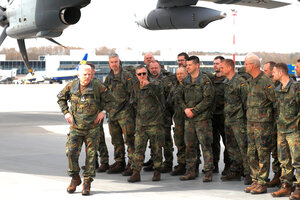A welcome for German leadership
In its first permanent stationing of combat troops outside of its borders, Germany shows it will stand for NATO’s values as well as defend countries most vulnerable to Russia.

German soldiers arrive at an airport in Vilnius, Lithuania, April 8.
AP
On April 8, or just shy of 79 years after Nazi forces surrendered in World War II, Germany began its first permanent stationing of combat troops outside its borders. The first of 4,800 German soldiers arrived in Lithuania – which borders Russia – to set up a military base. They were warmly welcomed by the Baltic nation as part of NATO’s new Forward Presence strategy against further Russian aggression in Europe.
The deployment is a historic “lighthouse project” for Germany after the Russian invasion of Ukraine, said Defense Minister Boris Pistorius. It is part of a “turning point” for Germany in improving its military and becoming a protector of European security, according to German Chancellor Olaf Scholz.
“Given Germany’s complex historical legacy and the state of its armed forces, the German commitment is astounding,” Māris Andžāns, a professor at Rīga Stradiņš University in Latvia, wrote for the Macdonald-Laurier Institute.
The German forces in Lithuania will complement American troops in Poland, British soldiers in Estonia, and Canadian soldiers in Latvia. Those Eastern Europe countries are considered among the most vulnerable if Russian President Vladimir Putin makes good on a promise to re-create the Soviet empire that fell in 1991. Russia has lately begun to increase its arms production by more than 60%.
Germany’s first temporary deployment of troops – in defense of Bosnia-Herzegovina – came in 1996, or more than a half-century after World War II. But such milestones did little to sway German opinion from a deep postwar pacifism. In 2011, as Russia began to flex its military might, a Polish foreign minister declared that he feared “German power less than German inaction.”
Now the Russian invasion has forced many Germans to “recognise that it may sometimes be necessary to defend territory, values and principles,” wrote Katja Hoyer, a German British historian, in the Financial Times.
Germany’s longtime reluctance to be a military leader has actually earned it a measure of trust within the 32-member NATO. “To some people, we now seem like a sometimes slow, but ultimately always helpful and, above all, reliable friend,” wrote commentator Matthias Koch in the German daily newspaper Frankfurter Rundschau. From the welcome given to German soldiers by Lithuanians on Monday, he may be right.

